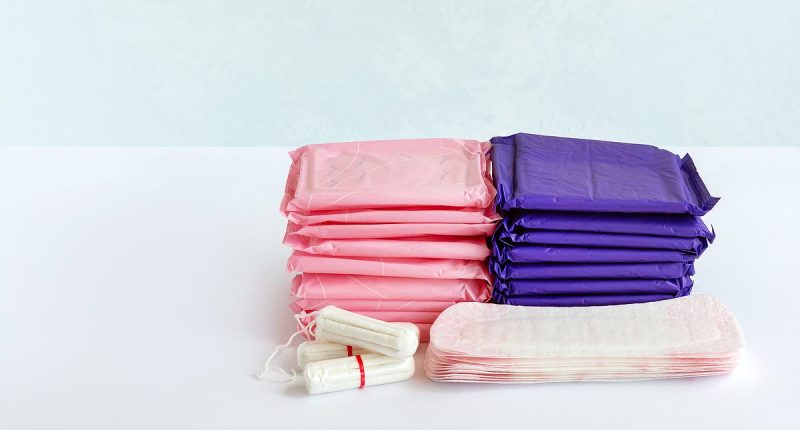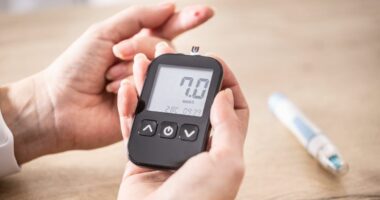Share this @internewscast.com
Girls who eat an unhealthy diet are more likely to start their periods worryingly early, putting them at increased risk of breast cancer in later life, a new study has suggested.
Researchers found that pre-teens who consume plenty of vegetables, wholegrains and lean meat were far more likely to hit puberty above the average age of 13, compared to those on a diet high in processed foods and salty snacks.
The results were independent of body mass index, suggesting that healthy diets are crucial regardless of wh a child is overweight.
The results were independent of body mass index, suggesting that healthy diets are crucial regardless of whether or not a child is overweight.
Previous studies have shown that starting puberty at a very young age can increase a woman’s cancer risk in later life.
This is thought to be due to prolonged exposure to reproductive hormones like oestrogen, which stimulates breast tissue, raising the risk of the disease.
A 2012 analysis, involving data from more than 100 studies, found that for every year younger a girl started her period, her risk of developing breast cancer increases by five per cent.
The researchers found that girls who started their period at around 10 years-old had a 25 per cent increased risk of breast cancer in later life, compared to girls who started their period aged 15.

Young girls are going through puberty earlier now than in decades past – and experts say that poor diets could be setting them up for complications such as breast cancer, diabetes and heart disease in adulthood.
Other studies found that girls who have their first period before the age of 11 have a 15-20 per cent increased risk of breast cancer.
It comes as studies suggest that the average age that puberty begins is on the decline in girls.
A study published last year found that girls born between 2000 and 2005 started their period at around 11, compared to 12 in the 60s and 70s.
The Harvard University researchers found that the proportion of girls starting their periods before the age of 11 had increased from 8.6 per cent to 15.5 per cent between 1950 and 2023.
Meanwhile, the proportion of girls who started their periods before the age of nine had more than doubled during that same time frame.
Professor Holly Harris, who led the current study, is now underscoring the need for young children and adolescents to have access to healthy, nutrient-dense meals.
The first of its kind study, published in the journal Human Reproduction, investigated the link between diet and the age girls started their period.
The researchers studied 7,530 girls, aged between 9 to 14, from the Growing Up Today Study (GUTS) in the US in two waves, from 19996 to 2001 and 2004 to 2008 respectively.
Upon joining the study girls completed a questionnaire about their diet, updating the researchers every one to three years.
They also reported their age when their period first started, in years and months.
The researchers assessed the girls’ diets against two established eating patterns, known as the alternative healthy eating index (AHEI) and the empirical dietary inflammatory pattern (EDIP).
The healthy index diet awards more points for healthier foods, such as vegetables, legumes and wholegrains, while typically unhealthy foods including red and processed meats and salt score lower.

Experts say eating a healthy diet made up of vegetables, legumes and whole grains could be linked to menstrual periods starting at an older age.
Foods that are more likely to cause inflammation in the body—such as processed meats, sugary drinks and refined carbohydrates like pasta and white breads—are reflected by the EDIP.
Over the course of the study, 93 per cent of girls had their first period at around 13-years-old.
Researchers found that the girls with the healthiest diets were 8 per cent less likely to have their first period within the first month of the study, compared to those who had unhealthy eating habits.
They also found that those with the most processed meat and refined carbohydrates in their diets were 15 per cent more likely to have their first period in this time.
These girls also reported completing less hours of exercise in comparison to the girls with the healthiest diets.
Prof Harris said: ‘We observed that these two dietary patterns were associated with age of menarche (the first menstrual cycle), indicating that a healthier diet was linked to menstrual periods starting at an older age.
‘Generally eating fruits, vegetables, whole grains, fatty fish, nuts and legumes, while limiting intake of red and processed meats, refined grains, sugar-sweetened beverages and added salt, benefits everyone regardless of age’, she added.
Menstruation usually starts around age 12, but experts such as Dr Natalie Shaw, a neuroendocrinologist at the National Institute of Environmental Health Sciences (NIEHS), have found that girls have increasingly been tending towards a younger onset.

Girls who start their period at an early age may be at higher risk for diabetes, obesity, breast cancer and heart disease. Breast cancer is the UK’s most common cancer.

A pooled analysis of data from more than 100 studies found that for every year younger a girl started her period, her risk of developing breast cancer increased by 5 per cent.
In some cases in the US, girls as young as six have started menstruating before noticing any other signs of puberty.
Experts have put this down to the ongoing obesity crisis, with fat cells containing hormonal properties triggering puberty at a younger age.
One of the most devastating consequences of starting puberty early is the increased risk of developing breast or uterine cancer later in life.
While it had been speculated on in previous years, ground breaking research in 2020 established the association between early puberty and breast cancer.
Dr Dale Sanders, chief epidemiologist at the National Institute of Environmental Health explained: ‘Girls experience hormonal changes during puberty, along with changes to the breast tissue itself, that we think could affect breast cancer risk.’
‘The breast is thought to be more vulnerable to carcinogens during periods of rapid development, like during puberty’, she added.
Dr Frank Biro, who led the 2020 research, agreed that early puberty can increase breast cancer risk.
Early menstruation is triggered by a hormone called insulin-like growth factor 1 (IGF 1).
Girls who have higher levels of this hormone at a young are more likely to go through puberty younger, and maintain high levels of IGF 1 throughout their life.
This hormone is liked to higher levels of oestrogen, which regulates the female reproductive system.
Women who have higher oestrogen levels typically have larger breasts and a thicker uterus lining than others. This in turn increases the risk of developing cancer.
‘When a cell is driven to grow, then you increase your risk of having a bad copy made of the cell that is growing’, Dr Biro explained.















